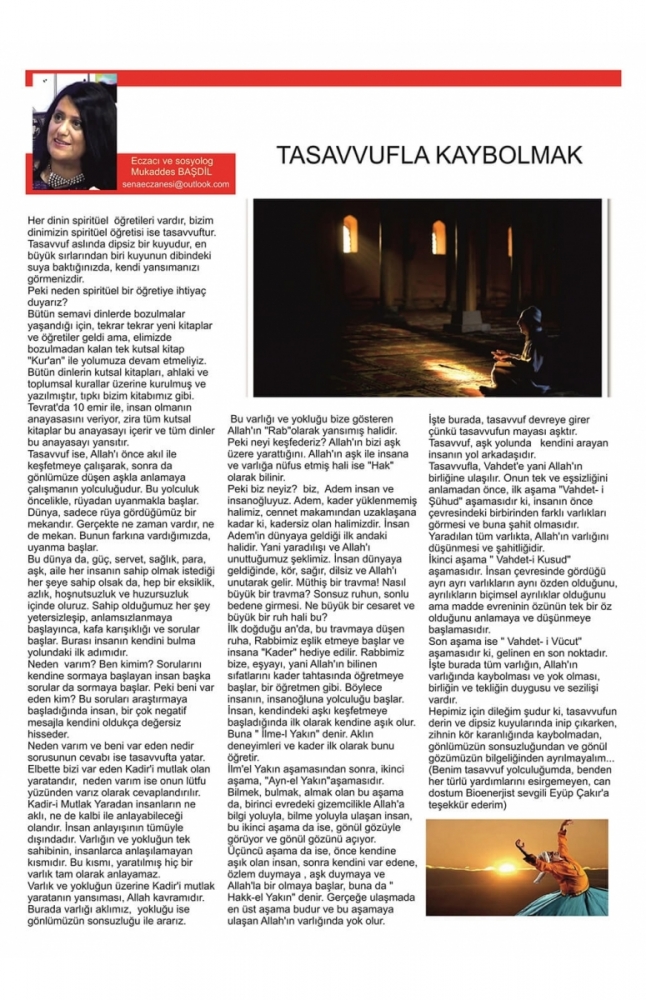No products

GETTING LOST IN MYSTICISM
Every religion has spiritual teachings, and the spiritual teaching of our religion is Sufism. Sufism is actually a bottomless well, one of its greatest secrets is that when you look at the water at the bottom of the well, you see your own reflection. So why do we need a spiritual teaching? Because all the Abrahamic religions have been corrupted, new books and teachings have come again and again, but we should continue on our way with the only holy book that remains intact, the Qur'an. The holy books of all religions are based on moral and social rules, just like our book. The Torah, with its 10 commandments, gives the constitution of being human, because all holy books contain this constitution and all religions reflect this constitution. Sufism, on the other hand, is the journey of trying to discover God first with the intellect and then trying to understand Him with the love that falls into our hearts. This journey begins with waking up from a dream. The world is only a place where we dream. In reality there is neither time nor space. When we realize this, awakening begins. In this world, even though we have power, wealth, health, money, love, family, everything that every human being wants to have, we are always in a state of lack, scarcity, discontentment and restlessness. When everything we have becomes inadequate and meaningless, confusion and questions begin. This is the first step towards finding oneself. The person who starts asking himself why do I exist, who am I, starts asking other questions. And who made me? When you start to investigate these questions, you get a lot of negative messages and you feel very worthless. The answer to the question of why do I exist and what makes me exist lies in Sufism. Of course, it is the Creator, the Almighty, who brings us into existence, and why do I exist is answered as we exist because of His grace. The Almighty Absolute Creator is the one that humans can understand neither with their minds nor with their hearts. It is completely beyond human understanding. It is the part of the sole owner of existence and non-existence that cannot be understood by humans. No created being can fully understand this part. The reflection of the Almighty absolute creator on existence and non-existence is the concept of Allah. Here we seek existence with our intellect and non-existence with the infinity of our heart. It is the reflection of Allah as "Lord" who shows us this existence and non-existence. So what do we discover? That Allah created us in love. The form of Allah that permeates human beings and existence through love is known as "Hak". So what are we? We are Adam, the human being and humankind. Adam is our state without destiny, our state without destiny until we move away from the paradise. The human being is Adam at the first moment he came into the world. That is, the form in which we forget creation and God. When man comes into the world, he comes blind, deaf, dumb and forgetting Allah. It is a great trauma! How great a trauma, the infinite soul entering a finite body. What a great courage and a great state of mind is this? Our Lord begins to accompany the soul that falls into this trauma at the moment of its first birth, and the human being is given the gift of "Destiny". Our Lord begins to teach us the things, the known attributes of Allah, on the board of destiny, like a teacher. Thus begins the journey of the human being to the human being. When man begins to discover love in himself, he first falls in love with himself. This is called "ilme-l Near". The experiences of the mind and destiny teach this first. After the Ilm'el Yakın stage, the second stage is the "Ayn-el Yakın" stage. In this stage, which is to know, to find, to receive, the human being who reaches God through knowledge, through knowing, through mysticism in the first stage, in this second stage, he sees with his heart's eye and opens his heart's eye. In the third stage, the human being, who first falls in love with himself, then begins to long for and love the One who brought him into existence and becomes one with Allah, and this is called "Haqq-el Near". This is the highest stage in reaching the truth and the one who reaches this stage disappears in the presence of Allah. This is where Sufism comes into play because the leaven of Sufism is love. Sufism is the companion of the person who seeks himself on the path of love. Sufism leads to Wahdat, the oneness of Allah. Before understanding His uniqueness and uniqueness, the first stage is the stage of "Wahdat- i Shuhud", which is when a person first sees and witnesses the different beings around him. It is the thought and witnessing of Allah's existence in all created beings. The second stage is the stage of "Vahdat-i Kusud". This is when a person begins to understand and think that the separate beings he sees around him are of the same essence, that the differences are formal differences, but that the essence of the material universe is a single essence. The final stage is the stage of "Wahdat- i Body", which is the ultimate point. Here is the sense and perception of unity and oneness, of the disappearance and annihilation of all existence in the existence of Allah. My wish for all of us is that, as we descend and ascend in the deep and bottomless wells of Sufism, we do not get lost in the blind darkness of the mind, and that we do not leave the infinity of our hearts and the wisdom of our heart's eye... (I would like to thank my dear friend, Bioenergist Eyüp Çakır, who has given me all kinds of help in my Sufi journey)

